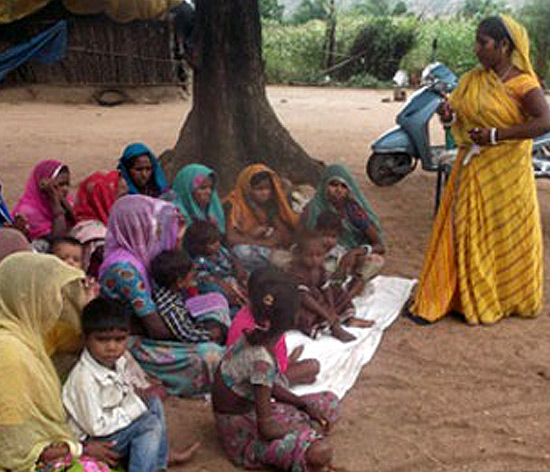
The state of Rajasthan has witnessed significant efforts to improve the economic conditions of the poor (particularly, the rural poor); yet, there are groups that face a severe disadvantage in accessing their rights, especially girls belonging to scheduled tribes. The barriers to development opportunities for marginalized sections are the result of a complex set of factors involving social, economic and political systems, and the way in which the other community engages with these deprived sections of the society.
Responding to these barriers, the Trusts supported the Foundation for Education and Development (FED) for implementing strategic educational interventions in rural areas of the state. FED was set up in August 2000 and since inception, its main activity has been the implementation of the Doosra Dashak (DD) programme, which was started in Rajasthan in June 2001 with the support of the Trusts. The programme focusses on education and development of adolescents in the 11-20 age group.
Initially, the Trusts directly supported the implementation of the Doosra Dashak project in Bap and Kishanganj blocks of Jodhpur and Baran districts, respectively. Concurrently, it included assistance of the Steering & Coordination Unit (SCU) of Doosra Dashak, established in Jaipur, with the purpose of coordinating and supporting activities in the two blocks, as well as for expansion in other areas. Subsequently, the financial support from the Trusts was augmented with funds from many other agencies and the programme was expanded to a few more blocks in other districts of the state. In 2003, DD was initiated in Abu Road block of Sirohi district.
Over a span of 14 years, the Doosra Dashak programme has reached out to around 45,000 adolescents and young women (particularly in difficult circumstances), through a variety of activities such as a four months' residential educational camp, life skill camps, continuing education centers, organization building (for youth and women groups), etc. The condensed Life Skill Education (LSE) camps of FED, try to tackle some aspects of marginalisation by addressing the rights of marginalised adolescents, gender and health in a comprehensive and coordinated way. Characterised by child-centered learning, these camps provide the target group a much-needed opportunity to learn in a congenial environment.
There are several evidences which speak volumes about how these camps have successfully engaged with rural adolescents and explored their qualities and helped them in their development. Lalita Kumari is one of them….
Lalita hails from Parmar Falli located at the foothills of the Redevar Mahadev in Abu Road block of Sirohi district. Staff of Abu Road block office of Doosra Dashak enthusiastically describe Lalita as a "high valued jewel". She belongs to a tribal family, and has seven younger siblings - three brothers and four sisters. She dropped out from mainstream education after 5th grade, before she came in contact with Doosra Dashak team. It was a challenging task to bring her out of her village and enlist her for the LSE camp. However, once enrolled, she was quite a support to the trainers. In the camp, not only did she find a fresh lease of life, but was also able to comprehend her learning and articulate her opinions strongly. Soon she began to confidently participate on subjects of Panchayati Raj, gender, religion, caste and health, during meetings.
Finally, Lalita got enrolled in Kasturba Gandhi Balika Vidyalaya (KGBV) and completed her 8th grade. She became an active participant of the programme activities. Being a member of the Kishori group, she got a vast exposure of the outer world. She never missed any opportunity to participate in exposure visits, short term trainings, etc. Her learning was constantly invigorated through activities at the continuing education centers, more popularly known as ikhvelos. Working as an active member of the Yuva Shakti Sangathan (YSS), over the years, she has developed an amazing ability to bring people together. Such has been the impact of her work as a member of YSS, that the community of Parmar Falli persuaded her to stand for elections and she won the ward panch elections in 2010. Today, Lalita is a proud, single mother of her son, working as an Asha Sahiyogini in her village. She was awarded the best Asha Sahiyogini of Abu Road block, in 2013.
Lalita's case is a confirmation of how the Trusts' supported programmes contribute towards creating an education system that can provide age-appropriate information to the adolescents. To continue the efforts in the realm of educating, organising and empowering adolescents, youth and women belonging to the most socially and economically marginalised communities in the remotest rural areas of Rajasthan, the Trusts included education as a key intervention area in their newly conceptualized, multi-thematic development intervention to transform the quality of life of 70,000 households in 4 backward tribal blocks of south Rajasthan, including Abu Road.
